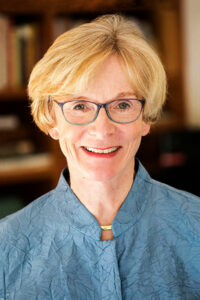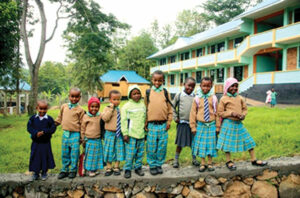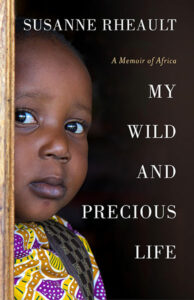Helping with tools to empower children and women in Africa

By Lauren Schiffman, Contributing Writer
In 2007, when she was working for the Clinton Foundation on AIDS prevention and treatment in Africa, licensed psychologist Susie Rheault “fell in love with the Africans.” Though her husband Gil Williams was stateside during this time, she eventually lured him to Africa in the hopes that they would both find smaller-scale work that would make a big impact locally.
In 2011, while on safari, Rheault and Williams found a two-room cement bunker that housed nine orphans who had lost their parents to AIDS.
“It was the grimmest thing we had ever seen,” Rheault said.
They saw the children; two beds; one bag of rice; and no toys, blankets, pillows or mosquito nets.
“We were stunned by the discrepancy between their circumstances and their own energy and vitality. The kids were delighted to have visitors,” she said.
Returning to the lodge where they were staying, Rehault and her husband paused and then realized that they had found their project. They approached William Modest, an “amazing human being,” who ran the orphanage with his wife, Sarah, and asked how they could help. Susie and Gil began securing funding for beds for the children, and upon their return to the States, started to “hit up everybody we knew” to secure sponsorships and other support. With the funds raised, they purchased beds, food and clothing and rebuilt the outhouse, which had no running water or electricity.
Modest sent photos of their projects to Susie and Gil, who saw firsthand the impact they had made on the community.
“We had a “big, fat family. It wasn’t an orphanage. The kids called William and Sarah ‘mother’ and ‘father.’ The kids came to know us, too. We learned a little Swahili to get us by,” Rheault said.
Today, Precious Project, which was established in 2010 and aims to eradicate poverty and illiteracy in the Tanzanian village of Nshupu, is a highly successful initiative that partners with NGOs in Tanzania the U.S., the latter of which serves as the fundraising vehicle. Susie and Gil now spend four to six months each year in Nshupu.
An on-site, 10-room school hosts 350 children, many of whom receive top scores in their district on national exams, which is no small feat, considering their circumstances.

“I know the damage that neglect and abuse can cause. I see no signs of trauma with them. If you lose your parents of origin and have other adults who are loving and constant, [children] can step into their lives in a meaningful way,” Rheault said.
The school is home to a baby class (nursery school) through seventh grade. Two children, just on the cusp of the age when female circumcision takes place – were even taken in from a nomadic tribe.
“They’d have been forced into a polygamous marriage for the price of cattle, and we got them out of that situation. One is now a trained baker, and the other is super smart and wants to become a cardiologist,” said Rheault.
The children also receive medical screening, as some are HIV positive and need medications and care at a clinic not far from the school.
Young women and their mothers also receive menstrual health education. Sadly, many of the girls drop out of school because they can’t afford costly sanitary supplies, or they must use bathrooms that do not meet basic needs.
“Many try to manage their period with leaves or mud. We train the girls, through a wonderful group of Swahili trainers, on how their bodies work. We give them tulip cups and washable sanitary pads.”
A dorm houses about 60 children who previously came to school hungry and tired. They receive special tutoring that enables them to progress with their education and take necessary exams. About 300 students receive full or partial scholarships, and are fed breakfast and a hot lunch.
An on-site, working organic farm with 300 chickens provides food for the students and additional revenue through sales at local markets.
While in Nshupu, Susie and Gil meet with the school’s faculty and directors to demonstrate the impact the community is making and how their donations support it.
“We’ve developed grassroots approaches that don’t entail white experts telling Africans how to manage their health. We train teens of locals who are well respected and opinion leaders in their villages on how to run sessions addressing health. Training also addresses how to get pregnant, HIV positive mothers to deliver in a clinic to prevent their newborns from being born with HIV,” Rehault said.
Mothers receive outreach, and women participate in a weekly empowerment program that enables them to use microloans to set up small businesses.
The group started with twenty members in 2012. Today, it serves fifty.
Susie authored a book about her experiences in Africa; My Wild and Precious Life: A Memoir of Africa will be out in September 2019. It provides insight into how Susie created a life of purpose for herself; how helplessness is learned through generations; how locals taught Susie about their culture and traditions; and how hope and hard work can result in big change.

For more information visit http://www.preciousproject.org/us-team.












